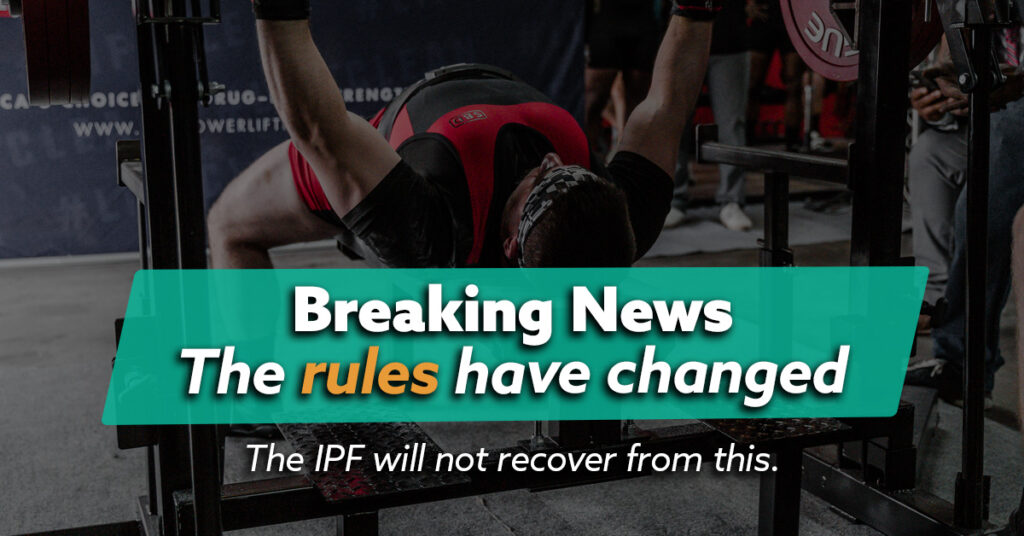You’ve probably heard the news. The IPF Executive committee has changed the rules of the Bench Press.
Notably, the rule change is quite convoluted. So, I’ll do my best to explain.
Effective January 1st, 2023, powerlifters will No longer be able to set up with their feet on the bench pad, and the lifter must lower the bar to the chest or abdominal area whereby the underside of the elbow is level with (or below) the top of the shoulder joint.
The intended effect of these rule changes is to minimize the hate received by the IPF due to the occasionally broken world record by an athlete who demonstrates a minimal range of motion and a high arch.
The IPF has clarified that this rule is supposed to help increase public appeal to the sport of powerlifting.
Great, in theory. However, there are many problems with the implementation and the implications of these new rules.
No Democracy, No Good.
1. This rule change sets a bad precedent.
The IPF Member Federations voted to give up their rights to vote on rule changes last year. Removing the democratic process regarding rule changes is a bit scary as it sets a precedent for what we may expect moving forward.
Thus, this decision was not voted upon by member nations (and if it were, it would likely fail to receive a majority vote).
Many sports federations have fallen because of the lack of democratic centralism in their organizational structure.
The less democratic an organization is, the more likely that the leaders of the organization become disconnected from their core audience, resulting in resentment, fractioning, and inevitable collapse.
2. Difficult Judging
The new rules will make it incredibly difficult for judges to officiate, especially at the international level. Our reliance on the Jury Table and video review will likely increase, and the total meet length will increase substantially. Powerlifting is slow enough, increasing wait times between the Squat, Bench Press, and Deadlift surely is not the intended outcome of this rule change. Though, it must be considered.
3. Fewer Available Judges
Many judges are already considering quitting due to this undemocratic rule change.
Less available judges lead to fewer competitions. Fewer competitions result in less audience reach. Less audience reach means less sport growth (at least on the competitive level within the IPF).
4. Targeting The Outliers
The IPF expects this rule to impact at least 5% of all IPF athletes.
There is no official number I could find on the total athletes competing in the IPF- but let’s say there are 20,000 athletes in the IPF.
5% of 20,000 is a minimum of 1,000 lifters that will need to change their technique to meet the new requirements.
Ripping the carpet from underneath even 5% of lifters is too many.
For many, powerlifting is their life. Athletes spend thousands of hours perfecting their craft, hoping to make it to the world stage.
Some of these lifters are anatomically advantaged. If this technique was so damaging to the sport, then why is it not more universally applied at the elite level?
5. Powerlifting is fragmented enough
The IPF is struggling to maintain members within the USA due to its recent split with the USAPL.
If the IPF wants to grow the sport, it must spend more time researching the key factors preventing growth from happening.
The justification for this rule change is thoughtless and disconnected from reality.
6. Anatomy is not universally homogenous.
Certainly, some powerlifters may intentionally exploit the rules to minimize the range of motion.
However, more commonly, lifters maximize their lumbar arch to help maximize upper back and shoulder stability.
More stability leads to lower injury risk and more potential force production.
Forcing a handful of lifters to change their technique could eliminate them from contention at the international level.
Imagine eliminating 7’1 basketball players from competing because watching them raise their arms and dunk the ball without jumping is less relatable.
Sport is NOT inherently fair. Rules don’t make lifting fair; they make it more exclusive. Some athletes are born with superior leverages; they should be able to take advantage of them.
Summary
Powerlifting is about lifting the maximum amount of weight possible for one repetition.
Yes, it’s frustrating to see some lifters bench press with less than 1 inch of ROM. However, neither the process nor the justification for this rule change is worth the likely consequences.
If this rule is maintained, I’m afraid the IPF may face the same fate as many other federations before it.

